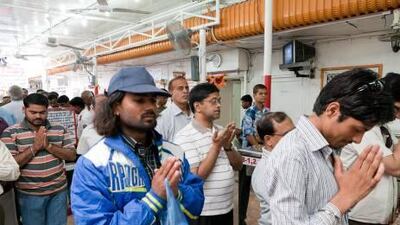DUBAI // People queue in their tens of thousands each week to pray at the Hindu Temple in Bur Dubai's Old Souk.
They must pass through an alleyway so narrow, one could almost put a hand on either wall. Once inside they have to proceed quickly through their rites, supervised by hired security guards. There is no time - or space - for them to linger.
On a recent day Prakash Chabria, a manager at the temple, waved his arms to move along several people who had stepped out of the queue to prostrate themselves on the floor.
"We allow them to do their prayers," he said, "but people can't stay for long".
The Shiva and Krishna Mandir temple complex in Al Bastakiya was built back in 1958, but its community has long outgrown it.
The Hindus share the overcrowded space with the Sikh community, but that group is set to move on. They have already been granted a plot of land from the Dubai Government and are opening a new centre in the coming months.
The Hindu temple's management has also put in a request with the Dubai Government for more land, but has yet to hear back.
"The area isn't important," said a staffer at the centre. "We'd be happy with whatever we are given."
There are 1.7 million Indians in the Emirates and although the number of Hindus is unknown, the Indian Consulate in Dubai estimates about 50 per cent of the Indian population are followers. The temple is the only gathering point for Hindus in the UAE and one of just a few in the Gulf, making it a sought-after spiritual lifeline. Things get even busier during religious holidays. The two-day Maha Shivaratri festival last year drew around 125,000 people. Their queues stretched for several kilometres, up to the Plaza Cinema.
"We have people coming from Saudi, Qatar, Bahrain and Oman," said Prakash Chabria, another manager at the temple. "Here is one of the only places where they can pray. They come in their thousands."
Inside the donations box, staff find coins and currencies from around the GCC as well as British pounds, American dollars and Chinese yuan.
The temple is unlike those normally found in India, located at the back of the souk in converted shop space. Devotees must proceed up one flight of steps on one corner of the building to the space, and then down another on the other side.
Every day of the week is devoted to an individual god; morning prayers start at 6am and run until 1pm; evening prayers run from 4.30pm to 10pm.
There are a handful of traders at the base of the temple selling prasad, or offerings, for Dh5 each. Each plastic bag contains flower petals, an apple, a small bottle of milk and a piece of cloth. Staff work furiously to open and repackage each offering - indicating they have been blessed by the god of that particular day - so it can be returned to the devotee on their way out.
"We believe that if you give something to the god, you will get something in return," said Prajhant Divecha, a devotee at the temple.
On the ground floor outside the temple, a number of shops sell statues of Hindu gods, bells, beads and other religious paraphernalia.
One of the best-loved is the one managed by Shankar Kanjani, 64, a community mainstay for the last decade.
"We are not interested in money," he said. "We only make enough to cover rent and salary. What we are doing is giving relief to people."
mcroucher@thenational.ae

